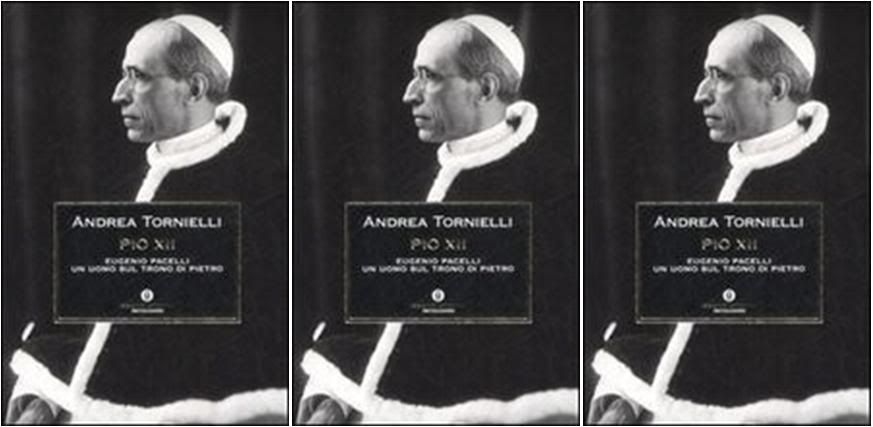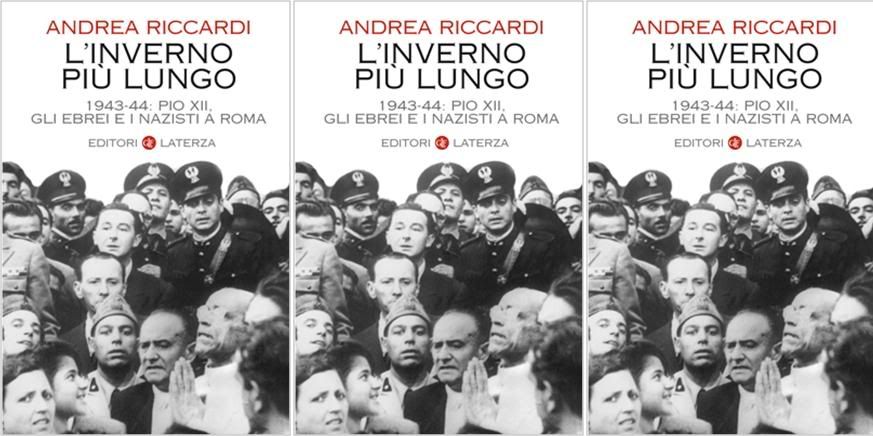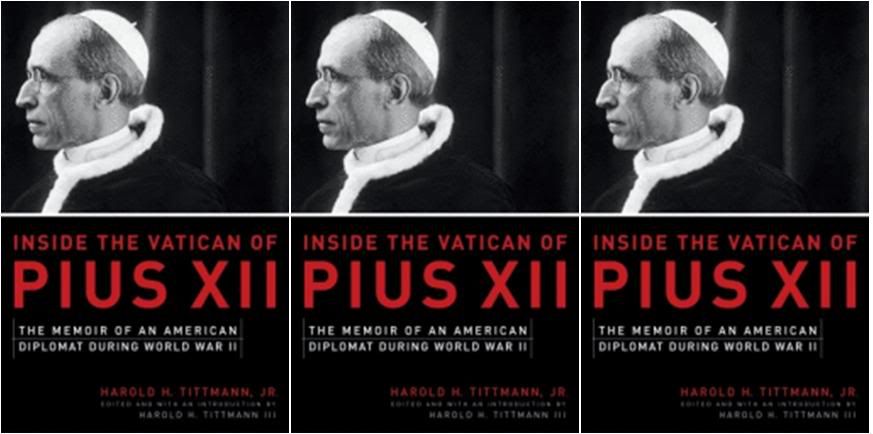
 In June 2008, Andrea Tornielli published a 682-page biography of Pius XII entitled Pio XII: Un'uomo sul trono di Pietro (Pius XII: A man on Peter's Chair) which is the definitive biography so far on the late Pope.
In June 2008, Andrea Tornielli published a 682-page biography of Pius XII entitled Pio XII: Un'uomo sul trono di Pietro (Pius XII: A man on Peter's Chair) which is the definitive biography so far on the late Pope.
 His comments about 'new' information relating to Pius XII's actions in World War II are therefore informed by the research he did for the book.
False scoop on Pius XII
His comments about 'new' information relating to Pius XII's actions in World War II are therefore informed by the research he did for the book.
False scoop on Pius XII
by 'historians' who have
not read previous books
by Andrea Tornielli
Translated from

In
Corriere della Sera and
La Stampa today, ample space is dedicated to supposedly new documents relative to the 'silence' of Pius XII in World War II.
Even
Il Giornale [where Tornielli writes], alas, has used it, though fortunately in much more minor time, reporting it as a news brief, trusting in the Italian news agency ANSA which published Sunday afternoon the 'revelations' of two scholars who are not new at reporting false scoops.
They are Giuseppe Casarrubea and Mario Cereghino who have been researching British archives, and in the past few years - supported by ANSA - they have been presenting their 'discoveries' describing them as previously unknown and unpublished.
And yesterday, on their blog, they even mocked the postulator of Pius XII's beatification cause, Jesuit Fr. Peter Gumpel, to read their documents first before going any farther.
Thus, through a major news agency, quickly taken up by all the major newspapers in Italy, they cite a report made by the American charge d'affairs Harold Tittman to his government about a conversation in October 1943 with Pius XII, during which the Pope reportedly said that up till then
[it was the month when the Germans sent off the only train of Jewish deportees from Rome to Auschwitz], the Germans had always respected the Holy See.
And do you know how 'previously unpublished' the document is? It was published in 1964 in the series
Foreign Relations of the United States (FRUS), Vol. 2 (on events in 1943), on page 950.
This text was published in the USA the year I was born, 45 years ago. So how could the two researchers not have known this? Basically, because they were researching British archives, in which they found a copy of the Tittman report, which the British had because Tittman had no diplomatic status and had to send his report through the British Embassy in Rome.
Even in Italy, it had been published much earlier by Ennio Nolfo in his book
Vaticano e Stati Uniti: dalle carte di Myron Taylor (Vatican and the USA: From the letters of Myron Taylor), Milan 1978, reissued in 2003.
And of course, the so-called 'previously unpublished' document has since been used and discussed in biographies and many books on Pius XII.
In the words of Prof. Matteo Luigi Napolitano, who has published a few books on the Pius XII issue, Casarrubea and Cereghini "did not bother to look up, as they continue to pass off as 'new' and 'previously unpublished' data which serious historians have known and discussed for years".
John Allen reported the Casarrubea-Ceseghini 'discoveries' in his blog February 1, 2010 blog entry, in which he seeks out the opinion of another historian, Prof. Andrea Riccardi [better known as the founder of the Sant'Egidio Community], who also wrote a recent book about Pius XII's wartime activities:

The title translates as The longest winter, 1943-1944: Pius XII, the Jews, and the Nazis in Rome... Allen takes the Cassarubea-Ceseghini line that the documents are 'new', obviously writing his log before Tornielli's was published:
New documents fuel debate over Pius XII

Feb. 01, 2010
Two new documents concerning Pius XII and the Holocaust unearthed in an English archive seem destined to add fuel to the fire of an already polarized debate about the World War II-era Pope’s alleged “silence.”
Italian news agencies are reporting today that the first document is a brief account of an Oct. 19, 1943, meeting between Pius XII and the American Ambassador to the Holy See, Harold Tittmann. Although that session came just three days after the deportation of Roman Jews by the Nazis, the subject apparently did not arise.
Instead, Tittmann reported that Pius XII urged the Allies to ensure that the city of Rome did not become a battleground.
Pius XII also expressed concern, according to the document, about “small bands of Communists” operating around the city which might commit acts of violence between the departure of German occupying forces and the arrival of the Allies. Reportedly, he also stated that up to that point, the German occupiers had demonstrated respect for the Holy See.
The second document, apparently much longer, is a report of a November 1944 conversation between Pius XII and British Ambassador Francis D’Arcy Osborne. According to that text, D’Arcy Osborne pressed the Pope to denounce the Nazi deportation of Jews then unfolding in Hungary.
Pius replied that he was also under pressure to denounce Soviet war crimes in Poland and the Baltic states, something D’Arcy Osborne urged him not to do because of its possible impact on public opinion. At the time, the Soviets were an ally of the United States and Great Britain.
According to today’s reports, Pius XII said he was still considering what to do, but that in any event, a papal condemnation would be “anonymous,” meaning that he would denounce abuses without mentioning the guilty parties by name.
When D’Arcy Osborne insisted that Soviet conduct could not be compared to the mass extermination of Jews in gas chambers by the Nazis, according to his report, Pius XII agreed.
Some commentators in the Italian press have predicted that the new documents put Pius XII in an unflattering light, confirming his general reluctance to speak out directly against the Nazis.
However, Andrea Riccardi, the founder of the Community of Sant’Egidio as well as a lay Catholic historian and a veteran of Catholic/Jewish dialogue, argued that they can be read in a different light.
The first document, Riccardi said, simply confirms Pius XII’s already well known concern for keeping Rome safe. The second, he said, illustrates his larger approach to crimes against humanity during the war – “to denounce the sin, but not the sinner.”
Pius’s agreement with D’Arcy Osborne that the Nazi campaign against the Jews could not be compared to other war crimes, Riccardi argued, is a “sign that the Pope was aware of the historical enormity of the Shoah as a crime without precedents.”
The two documents were revealed by Italian researchers Mario J. Cereghino and Giuseppe Casarrubea, best known for their work on the Mafia.
Back in 1999, there was this article in Catholic Insight about Tittman's reports on Pius XII - which I just stumbled on while googling 'Tittman' [presumably Casarrubea and Ceseghini never bothered to google Tittman, who, in fact, wrote a book called Inside the Vatican of Pius XII that was published posthumously in 2004.
The following is an excerpt from the 1999 article written soon after the publication of the late Fr. Blet's one-volume summary of the 12-volume compilation he adn three other historians made of the Vatican Archive documents concerning Pius XII's wartime activities:
Pius XII under attack
... The latest "revelation" from Washington, "kept secret until now," it was said, is the charge that Harold Tittman, specially appointed presidential delegate to the Vatican during World War II, had reported that in an audience on December 30, 1942, Pius XII told him "that he believed the news of the Nazi atrocities against the Jews were exaggerated" and that he would "denounce the Allies if they bombed Rome."
Tittman, in turn, told a "surprised" Pope that his Christmas message condemning the Nazis was insufficient in the eyes of public opinion.
First, the document has been known for 35 years, and was printed in Saul Friedlander's hostile book
Pius XII and the Reich (1964) and Owen Chadwick's more nuanced
Britain and the Vatican (1986).
Secondly, the Tittman report should be seen in the light of the impatience of Roosevelt, who had been in the war for only a year, who portrayed new-found ally Josef Stalin as a lovable Uncle Joe, and who was building pressure on the Pope to make unconditional flaming statements on behalf of the Allies.
When Pius XII maintained his independent judgement about Allied (including Bolshevik) motives and goals, Tittman was none too pleased and his account of what the Pope actually said should be treated with caution.
 Much better yet is a 2004 review of the Tittman book (the memoir was edited and published posthumously by his son, who lived with his father in Rome during the war years) in First Things
www.firstthings.com/article/2008/12/001-the-unsilent-pope-15
which says at the outset:
Much better yet is a 2004 review of the Tittman book (the memoir was edited and published posthumously by his son, who lived with his father in Rome during the war years) in First Things
www.firstthings.com/article/2008/12/001-the-unsilent-pope-15
which says at the outset:
...In works from Saul Friedlander’s 1966 Pius XII and the Third Reich to John Cornwell’s 1999 Hitler’s Pope, the occasional criticisms expressed in Tittmann’s dispatches have been quoted against Pius. Now we have the dispassionate postwar reflections of Tittmann himself, which paint a very different picture.
... Given Tittmann’s importance in the debate about the papacy during the war, these memoirs may be the most important document to be published on Pius XII in over twenty years. And they prove to be, far from an indictment, an overwhelming defense of the Pope and the Catholic Church...
[Modificato da TERESA BENEDETTA 08/02/2010 14:09]